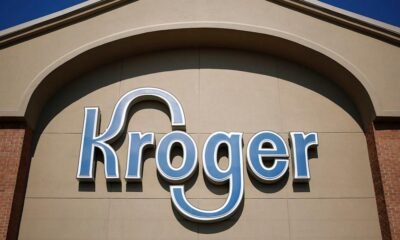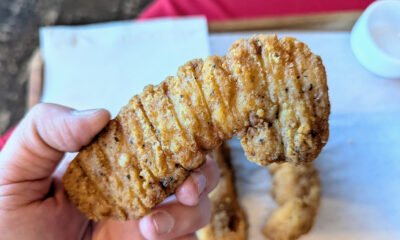FOOD & WINE
KFC and Mountain Dew Drop Peaches and Cream Dirty Soda and Fans Are Calling It Summer in a Cup
The viral dirty soda trend continues with KFC’s exclusive Peaches and Cream Sweet Lightning Mountain Dew launch

Just in time for the summer heat, KFC and Mountain Dew have teamed up to deliver what could be this season’s most refreshing guilty pleasure—a bold, creamy, fruit-flavored twist on soda that’s already making waves online. Introducing the all-new Mountain Dew Sweet Lightning Peaches & Cream, a dirty soda exclusive available only at participating KFC restaurants nationwide starting June 9, 2025.
This limited-time concoction blends the tropical notes of peach and honey—already present in KFC’s fan-favorite Sweet Lightning soda—with a luscious vanilla cream swirl that transforms it into what some are calling a “drinkable creamsicle.” Inspired by the viral dirty soda trend popularized by Gen Z and Millennials, the collaboration captures nostalgia, novelty, and flavor in every sip.
KFC’s team confirmed that this is more than just a seasonal gimmick. “It’s about leaning into how customers want to experience flavor—unexpected, fun, and totally Instagrammable,” said a KFC spokesperson. For those unfamiliar, dirty sodas typically involve mixing a carbonated soft drink with flavored syrups and cream, turning a basic beverage into a dessert-like treat.
The Sweet Lightning Peaches & Cream soda can be paired with KFC’s re-released Fill Ups meals, which also returned as part of the brand’s promotional partnership with the upcoming F1: The Movie. Starting at just $7, the Fill Ups include four different box meals, from crispy tenders to the iconic Famous Bowl, each coming with sides, dessert, and a medium drink. Yes, that drink could be your new go-to dirty soda.
But KFC isn’t the only fast-food giant embracing this fizzy phenomenon. Earlier this year, Taco Bell—another Yum! Brands franchise—tested its own version of dirty Mountain Dew Baja Blast, and Papa John’s rolled out a sweet and sour “Cini Dirty Soda” that sparked debate across social media.
Still, KFC’s Peaches & Cream edition feels different. It’s summer bottled, a chilled escape in the form of a soda cup. The limited-edition beverage is already creating buzz on TikTok and Reddit, with early samplers calling it “surprisingly delicious” and “basically summer in a cup.” One viral video even compared it to “what nostalgia would taste like if it had bubbles.”
As soda culture continues to evolve beyond the fountain classics, this creamy, fruity innovation might just solidify KFC’s position at the forefront of the dirty soda craze. But don’t wait too long—the drink is available for a limited time, while supplies last.
FOOD & WINE
Why Your Groceries Keep Draining Your Wallet: What’s Really Behind America’s Food Price Spike
Rising supermarket bills have become the new normal for US families — here’s what’s pushing prices up and how long it might last.
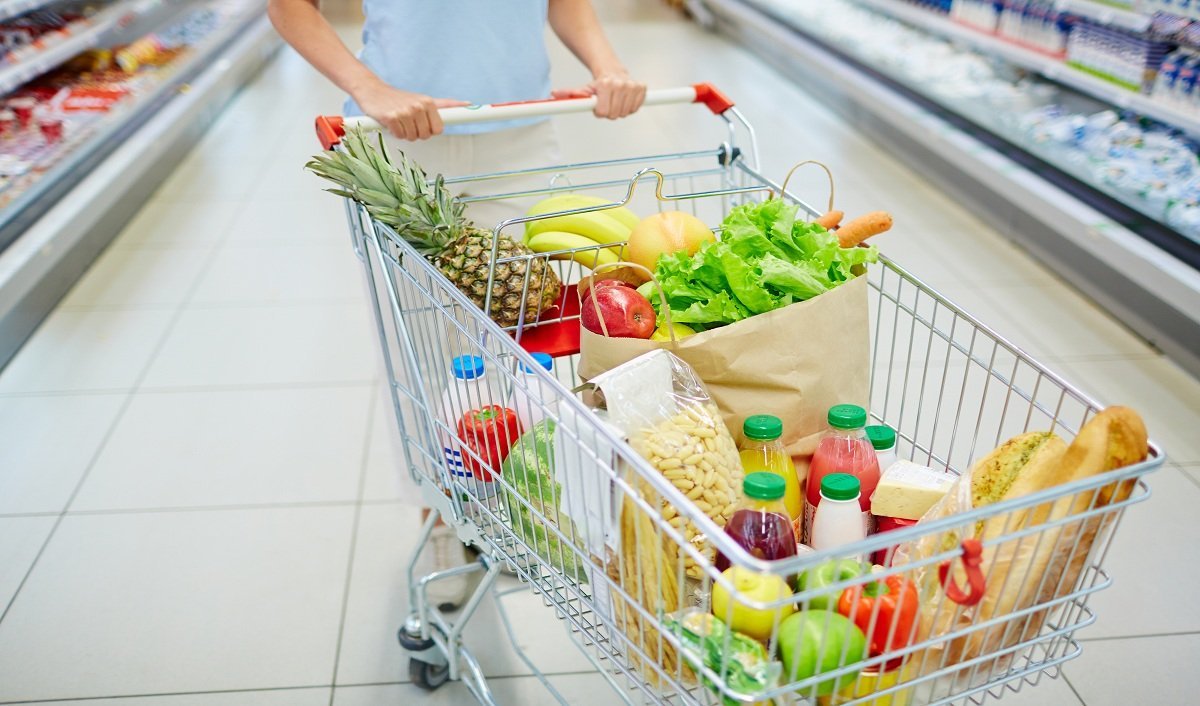
If your grocery receipts have you doing a double take lately, you’re not alone. Across the United States, food prices are rising faster than many paychecks can keep up — and everyday essentials like bread, milk, eggs, and fresh vegetables are quietly turning into budget busters for millions of households.
So, what’s really cooking behind this price surge?
Experts point to a blend of stubborn factors creating a perfect storm. Climate-related crop damage, supply chain hiccups that never fully recovered post-pandemic, and global conflicts that squeeze imports are all part of the puzzle.
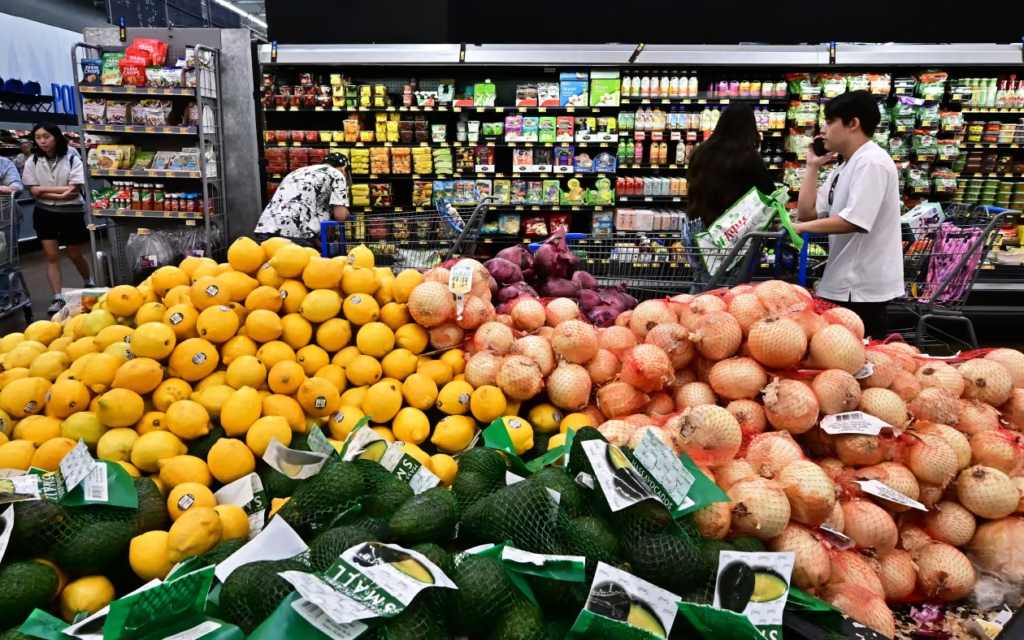
For instance, droughts across key agricultural regions have shrunk harvests of grains and vegetables. Meanwhile, unpredictable global shipping routes and higher fuel costs make it costlier to transport everything from chicken feed to fresh fruit. Add labor shortages in food processing and farming, and prices inevitably creep higher — leaving you paying more for the same shopping cart.
Families changing habits to cope
A recent national survey revealed that more Americans are turning to bulk buying clubs, discount grocers, and farmers markets to stretch their dollars. Some households are cutting down on restaurant meals and takeout, opting instead to cook at home — but even pantry staples aren’t spared from price jumps.
“It’s becoming a juggling act,” says Angela Thomas, a mother of two from Ohio. “I’ve switched brands, clipped coupons, and even changed my family’s meal plan to make our budget work.”
Is relief in sight?
Economists say relief may be slow and uneven. While inflation has cooled for some sectors, food costs remain stubborn due to persistent production and transport challenges. The USDA projects prices may stabilize later this year, but don’t expect to see pre-2020 price tags anytime soon.

Tips to weather the storm
Nutritionists and budget experts advise buying seasonal produce, planning meals in advance, and making use of local food co-ops. Freezing leftovers and cooking in batches can also help households fight waste and save money in the long run.
The bigger picture
When food costs soar, it impacts more than just dinner tables. It shapes wage demands, influences interest rate decisions, and puts pressure on policymakers to balance economic growth with the cost of living.
Bottom line?
Your grocery bill may remain a little too high for comfort for a while longer — but smart shopping and mindful planning can help American families navigate these costly times until the tide finally turns.
FOOD & WINE
“USA TODAY’s 2025 Wine & Food Experience Tour is Back — Chefs Tease ‘Surprise Menus and Secret Pairings’”
America’s favorite culinary roadshow returns with bigger bites, bolder sips, and a few delicious twists foodies can’t stop whispering about.
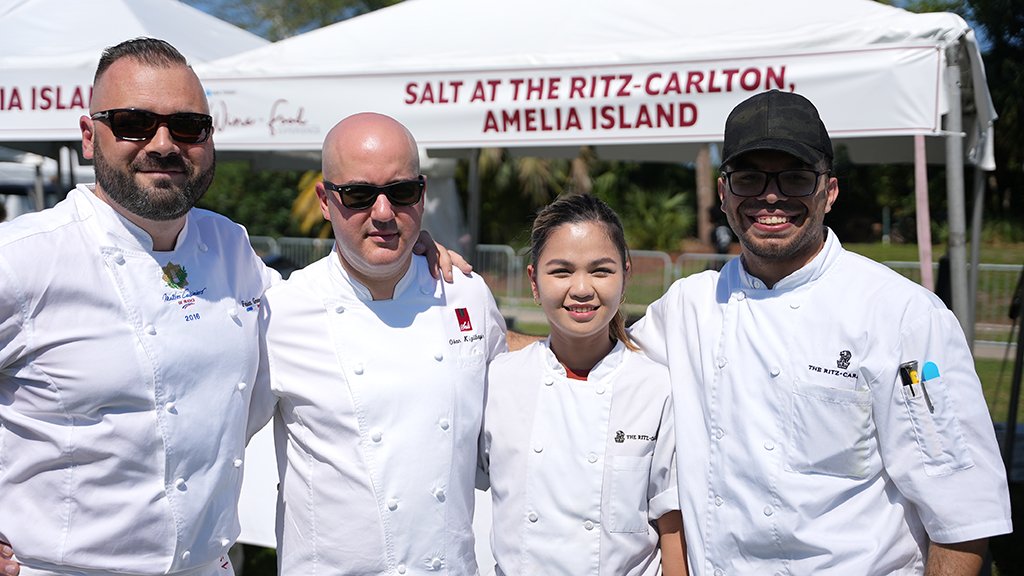
Food lovers, mark your calendars and loosen your belts — the highly anticipated 2025 USA TODAY Wine & Food Experience Tour is officially on the road again, promising a series of mouthwatering pit stops in some of America’s tastiest cities.
For those uninitiated, the Wine & Food Experience is not your average food festival. Picture dozens of top-tier chefs, local culinary heroes, and renowned wineries gathering under open skies to spoil your taste buds rotten. From curated bites and exclusive pours to live demos and meet-and-greet sessions with culinary icons, each city stop is crafted to celebrate the region’s unique flavors with a generous side of surprise.
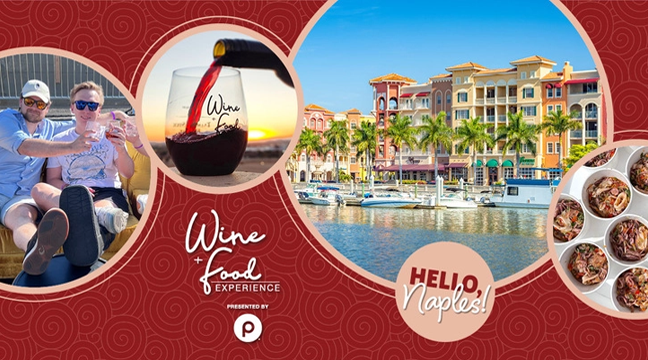
This year’s tour will roll through foodie hotspots like Austin, Chicago, Miami, and Denver, turning ordinary weekends into unforgettable feasts. USA TODAY insiders hint that 2025’s edition will up the ante with “secret tasting menus” and “off-menu pairings” unveiled only to guests who dare to ask.
Chef Tanya Holland, one of the headliners for this year’s tour, teased in a recent interview, “I’ve got something special planned that’s not even on my restaurant menu. Let’s just say, come hungry and curious.”
Beyond the bites and sips, attendees can expect immersive cooking demos, wine seminars by master sommeliers, and live music to keep the mood high. Organizers are doubling down on local farm-to-table collaborations and eco-friendly event setups, making each stop a love letter to sustainable indulgence.
Veteran foodies know the real trick: grab your tickets early and come early — because when a chef decides to drop a limited-run bite or a winery uncorks that rare vintage, word spreads fast and lines form faster.
Tickets for the 2025 Wine & Food Experience are on sale now and vary by city. VIP passes include early entry, exclusive tastings, and a chance to clink glasses with the chefs themselves.
One thing’s for sure: whether you’re a wine novice, a seasoned foodie, or just in it for the ‘gram, this year’s tour promises flavors you won’t soon forget — and maybe a few you’ll still dream about next season.
FOOD & WINE
Top Chef Winner Tristen Epps Turns Oxtail and Rice Into a Crown for Black Cuisine
Season 22 champion Tristen Epps cooks through grief, heritage and global flavors to redefine New American dining with soul and skill.

Tristen Epps didn’t just win Top Chef Season 22—he redefined what excellence in New American cuisine can look like when anchored in the deep roots of Black foodways. His victory wasn’t just a trophy moment; it was a triumphant testament to turning grief into greatness, and humble ingredients into culinary royalty.
When his father Russell Long passed away during filming, Epps stood at a crossroads no chef wants to face mid-competition: return home to mourn or stay to finish what he started. It was his mother’s late-night words—“Make it worth it”—that turned a talented chef into a force of nature determined to honor both family and heritage through every plate.
From the bustling filming kitchens in Canada to the grand finale in Milan, Epps channeled memories, flavors, and raw emotion into his craft. His show-stopping oxtail Milanese—tender braised oxtail formed into a classic ossobucco cut, perched on curry-spiced Carolina rice grits—left even the most seasoned judges stunned. The dish weaved together West Africa, the Caribbean, the American South, and a nod to Italy’s culinary tradition, all in a single bite. Guest judge Gregory Gourdet, a Top Chef legend himself, beamed with delight at witnessing Epps ascend to his rightful spotlight.
Long before the lights and cameras, Epps collected flavor stories as a military kid traveling the world. Later, he refined his skills alongside his mentor Marcus Samuelsson, whose praise for Epps—*“a cook’s cook and a chef’s chef”—*says it all. From the Greenbrier’s grand kitchens in West Virginia to projects spanning London, Sweden, Bermuda, the Bahamas, and Miami, Epps built a repertoire as global as his roots.
Today, the Houston-based chef is not slowing down. Between pop-ups, family time with his partner Casey Giltner and their baby son, pickleball matches, and tending his garden of fresh herbs and fiery chiles, he’s also planting seeds for his next big dream: an intimate fine dining restaurant called Buboy, named after his grandfather. Naturally, its emblem will be an oxtail bone—a fitting crown for a cuisine that turns humble cuts into culinary diamonds.
For Epps, winning Top Chef was never about ego. It was about pushing Black cuisine into the mainstream with pride, rigor, and narrative power. As he told judges and fans alike: “I wanted to give validation and format and credibility to my cuisine.” Mission accomplished.
-

 US News6 days ago
US News6 days ago“She Never Made It Out…” Albany House Fire Claims Woman’s Life as Family Pleads for Help to Bring Her Home
-

 Entertainment1 week ago
Entertainment1 week ago“Detective, Psychologist, Anthropologist?” — Inside the Secret World of Casting Directors Behind ‘F1,’ ‘The Smashing Machine’ and ‘Marty Supreme’
-

 Entertainment5 days ago
Entertainment5 days agoXG Star Cocona Shares a Brave Truth at 20 — “I Was Born Female, But That Label Never Represented Who I Truly Am…”
-

 Entertainment5 days ago
Entertainment5 days agoSamba Schutte Reveals the Surprise Cameo in Pluribus That “Nobody Saw Coming”… and Why John Cena Was Perfect for the Role
-

 Entertainment1 week ago
Entertainment1 week agoLegendary Guitarist Steve Cropper Dies at 84… Tributes Pour In for the Soul Icon Behind ‘Green Onions’ and ‘Soul Man’
-

 Entertainment6 days ago
Entertainment6 days agoNika & Madison stuns global audiences as director Eva Thomas reveals why “resilience, not fear, drives Indigenous women on the run”
-

 Politics4 days ago
Politics4 days ago“Billions and Billions Have Watched Them…” Trump Makes History Hosting Kennedy Center Honors and Praising Stallone, Kiss, and More
-

 Entertainment1 week ago
Entertainment1 week agoBeloved Sundance Communications Chief Tammie Rosen Dies at 49… Tribeca Icons Say “She Was Singularly Remarkable”




